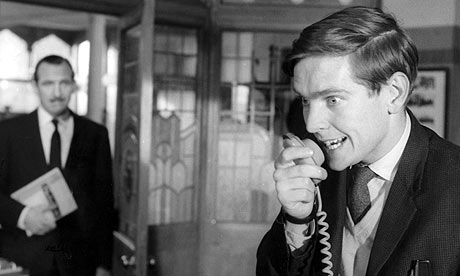Based on the 1959 novel by Keith Waterhouse, "Billy Liar" would be adapted into a play and would be released as a film in 1963. The film would be part of the "British New Wave" that was inspired years earlier by the "French New Wave" cinema. I would hate to use the word "Kitchen Sink" but this film may fall into that category considering the era when it was made and the portrayal of the working middle class struggling to make it on the big city.
A young man named Billy Fisher (Tom Courtenay) lives with his parents and works as a clerk for an undertaker's firm. He is constantly nagged by his mother Alice (Mona Washbourne) and is dubbed Billy Liar by his officemates Arthur (Rodney Bewes) and Stamp (George Innes) for inventing the most outlandish lies.
The film alternates from Billy's reality to his daydreaming as he fantasizes of a fictional kingdom called Ambrosia which he imagines himself as it's ruler and hero to satisfy his ego. His reality is far dimmer however as he is known to invent tragic circumstances about his family and steal promotional calendars from the company.
He is also engaged to 2 women both who are not aware of his philandering, but this becomes more complicated with the unexpected return of a former flame Liz (Julie Christie) whom he really cares for.
The film was shot in black and white outlines the working class background of it's hero, Courtenay plays Billy like a young kid trapped in a man's body playing his life like a one big game.
"So that scene with Donald Sutherland was interesting."
The character of Billy is probably one of the most unsympathetic characters I have seen on film, he has aspirations of being a scriptwriter but he doesn't seem to have the guts to follow his dreams. Only with the interference of Liz does Billy seemed to realize his potential but the trouble with his grandmother changes all of this. The scene where he told his mother that he will be leaving home in spite of his mother's plea for him to stay really broke my heart.
"The bastard is lying again."
I just couldn't stand a mother's heart breaking especially if it was her own son who would do it and I wished I could just reach over and punch Billy in the face but the ending proved otherwise and that family for Billy it seems is the most important thing for him at that moment.
The director John Schlesinger made it a point that Billy is not the main character to be liked but the people who cared for him the most were the people you were rooting for.
The film's black and white cinematography also added to the film's grittiness and realism even though Billy at times enter his own fantasy world, the director's perspective nonetheless is shown on a wider scope and the drama is made real. Even though the character of Billy is not really likable, Schlesinger still made us root for Billy for the sake of the people around him. The director 6 years removed from directing "Midnight Cowboy" directed a memorable film worthy of being called a classic.
Grade: A-







No comments:
Post a Comment